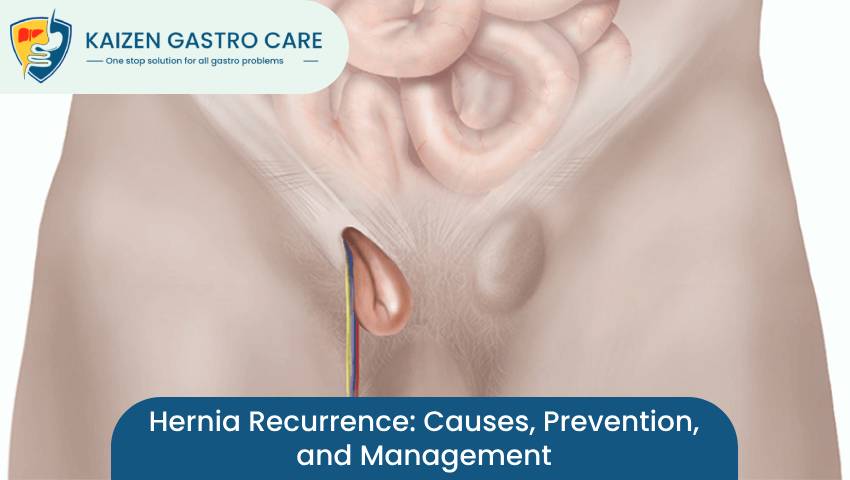
- 08/02/2024
- Kaizen Gastro Care
- 0 Comments
- Digestive Disorder
Hernia Recurrence: Causes, Prevention, and Management
Hernias are a common medical condition that affects millions of individuals worldwide. While surgical repair is usually successful, there is always a risk of hernia recurrence. Understanding the causes, prevention strategies, and effective management techniques is vital for both patients and healthcare providers. At Kaizen Gastro Care, we prioritize comprehensive care and education for our patients, ensuring they have the knowledge and support needed to navigate their hernia journey successfully.
What is Hernia Recurrence?
A hernia happens when an internal organ pushes through a weakened area in your muscle wall. While surgery usually repairs the issue, sometimes the bulge can return. This is known as a recurrent hernia, and it’s more common than you might think.
What are the causes of Hernia Recurrence?
Hernia recurrence happens when the tissue or organ that was repaired during surgery protrudes through the weakened area again. Several factors can contribute to this, including:
- Surgical Technique: The choice of surgical approach and the skill of the surgeon play significant roles in determining the risk of hernia recurrence. Techniques such as tension-free mesh repair have been shown to reduce recurrence rates compared to traditional suture repairs.
- Tissue Healing: In some cases, the tissues may not heal properly after surgery, leading to a weakened area that is susceptible to hernia recurrence.
- Increased Intra-abdominal Pressure: Exercises that increase intra-abdominal pressure, such as heavy lifting, persistent coughing, or pushing during bowel movements, can strain the abdominal muscles and potentially cause a hernia to recur.
- Obesity: Excess weight puts additional pressure on the abdominal wall, making it more likely for a hernia to recur.
- Physical Strain: Activities that put excessive pressure on the abdominal muscles, such as heavy lifting or strenuous exercise, can enhance the risk of hernia recurrence, especially during the early stages of recovery.
- Lifestyle Factors: Smoking and poor nutrition can compromise the body’s ability to heal and improve the risk of hernia recurrence.
- Incomplete repair: During surgery, the weakened tissue might not be fully addressed, allowing the hernia to move back through.
How to prevent Hernia Recurrence?
- Maintain a Healthy Weight: Maintaining a healthy weight through proper diet and exercise can help relieve the pressure on the abdominal wall and lower the risk of hernia recurrence.
- Avoid Heavy Lifting: Limiting activities that involve heavy lifting or straining can help prevent additional stress on the abdominal muscles.
- Quit Smoking: Smoking can damage the body’s ability to heal properly after surgery, raising the risk of complications, including hernia recurrence. Quitting smoking can enhance surgical outcomes and lower the risk of recurrence.
- Practice Good Posture: Poor posture can strain the abdominal muscles and improve the risk of hernia recurrence. Practicing good posture and avoiding activities that put excessive strain on the abdomen can help control recurrence.
- Manage chronic conditions: Consult with Dr. Samrat Jankar to manage any underlying health issues that might weaken your tissues.
- Eat a balanced diet: A nutritious diet rich in fruits, vegetables, and whole grains provides your body with the nutrients it needs for optimal healing and tissue strength.
- Follow Dr. Samrat Jankar’s Instructions: Adhering to postoperative instructions provided by the best hernia surgeon in Pune, Dr. Samrat Jankar, such as avoiding strenuous activities and properly caring for the surgical incision site, is crucial for promoting proper healing and lowering the risk of hernia recurrence.
Management Techniques:
If hernia recurrence occurs, quick evaluation and treatment are crucial. Our skilled hernia specialists in Pune provide a wide range of management choices, such as:
- Surgical Revision: Surgery may be required to treat the hernia and strengthen the weakening abdominal wall in cases of hernia recurrence.
- Non-surgical Management: In some cases, non-surgical methods, such as lifestyle changes or the use of supportive garments, may be recommended to manage signs and reduce the risk of complications.
- Ongoing Monitoring: Regular follow-up appointments with hernia surgeons are essential for monitoring the surgical site and addressing any concerns or signs promptly.
Living with a Recurrent Hernia:
Don’t panic if you get a recurring hernia! Schedule an appointment with Dr. Samrat Jankar, the best hernia surgeon in Pune, Maharashtra, to discuss your options. Treatment depends on the severity of the hernia and your individual situation. It might involve observation, lifestyle modifications, or another surgical repair.
Conclusion:
Recurrence of a hernia is a difficult complication that needs to be managed carefully and treated individually. By understanding the causes of hernia recurrence and adopting preventive strategies, people can reduce their risk of experiencing this complication. For those who do experience hernia recurrence, Kaizen Gastro Care offers expert management options tailored to each patient’s needs, ensuring the best possible outcomes and quality of life.
